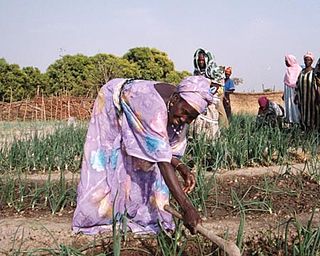
A cooperative is "an autonomous association of persons united voluntarily to meet their common economic, social and cultural needs and aspirations through a jointly owned and democratically-controlled enterprise". Cooperatives are democratically controlled by their members, with each member having one vote in electing the board of directors. They differ from collectives in that they are generally built from the bottom-up, rather than the top-down. Cooperatives may include:
An umbrella organization is an association of institutions who work together formally to coordinate activities and/or pool resources. In business, political, and other environments, it provides resources and identities to the smaller organizations. In this kind of arrangement, it is sometimes responsible, to some degree, for the groups under its care. Umbrella organizations are prominent in cooperatives and in civil society, and can engage in advocacy or collective bargaining on behalf of ther members.

A housing cooperative, or housing co-op, is a legal entity, usually a cooperative or a corporation, which owns real estate, consisting of one or more residential buildings; it is one type of housing tenure. Typically housing cooperatives are owned by shareholders but in some cases they can be owned by a non-profit organization. They are a distinctive form of home ownership that have many characteristics that differ from other residential arrangements such as single family home ownership, condominiums and renting.
Demutualization is the process by which a customer-owned mutual organization (mutual) or co-operative changes legal form to a joint stock company. It is sometimes called stocking or privatization. As part of the demutualization process, members of a mutual usually receive a "windfall" payout, in the form of shares in the successor company, a cash payment, or a mixture of both. Mutualization or mutualisation is the opposite process, wherein a shareholder-owned company is converted into a mutual organization, typically through takeover by an existing mutual organization. Furthermore, re-mutualization depicts the process of aligning or refreshing the interest and objectives of the members of the mutual society.
A worker cooperative is a cooperative owned and self-managed by its workers. This control may mean a firm where every worker-owner participates in decision-making in a democratic fashion, or it may refer to one in which management is elected by every worker-owner who each have one vote. Worker cooperatives may also be referred to as labor-managed firms.

The official languages of Canada are English and French, which "have equality of status and equal rights and privileges as to their use in all institutions of the Parliament and Government of Canada," according to Canada's constitution. "Official bilingualism" is the term used in Canada to collectively describe the policies, constitutional provisions, and laws that ensure legal equality of English and French in the Parliament and courts of Canada, protect the linguistic rights of English- and French-speaking minorities in different provinces, and ensure a level of government services in both languages across Canada.

An agricultural cooperative, also known as a farmers' co-op, is a producer cooperative in which farmers pool their resources in certain areas of activities.

Caisse populaire acadienne ltée, operating as UNI Financial Cooperation, is a Francophone credit union based in New Brunswick, Canada whose members are primarily Acadians. UNI's administrative headquarters are in Caraquet on the Acadian Peninsula.

The International Cooperative Alliance (ICA) is a non-governmental cooperative organization founded in 1895 to unite, represent and serve cooperatives worldwide. The ICA is the custodian of the internationally recognised definition, values and principles of a cooperative in the ICA Statement on the Cooperative Identity. The ICA represents 315 co-operative federation and organisations in 107 countries.

A consumers' co-operative is an enterprise owned by consumers and managed democratically and that aims at fulfilling the needs and aspirations of its members. Such co-operatives operate within the market system, independently of the state, as a form of mutual aid, oriented toward service rather than pecuniary profit. Many cooperatives, however, do have a degree of profit orientation. Just like other corporations, some cooperatives issue dividends to owners based on a share of total net profit or earnings ; or based on a percentage of the total amount of purchases made by the owner. Regardless of whether they issue a dividend or not, most consumers’ cooperatives will offer owners discounts and preferential access to goods and services.

Cooperative banking is retail and commercial banking organized on a cooperative basis. Cooperative banking institutions take deposits and lend money in most parts of the world.

Cooperativeeconomics is a field of economics that incorporates cooperative studies and political economy toward the study and management of cooperatives.
A student housing cooperative, also known as co-operative housing, is a housing cooperative for student members. Members live in alternative cooperative housing that they personally own and maintain. These houses are designed to lower housing costs while providing an educational and community environment for students to live and grow in. They are, in general, nonprofit, communal, and self-governing, with students pooling their monetary and personal resources to create a community style home. Many student housing cooperatives share operation and governing of the house. As with most cooperatives, student housing coops follow the Rochdale Principles and promote collaboration and community work done by the members for mutual benefit.

The European Association of Co-operative Banks (EACB) is a European interest group representing cooperative banks in the European Union (EU) and five non-European countries. Established in 1970, the non-profit association "represents, promotes and defends" the common interests of its 27 member institutions and 2.500 cooperative banks regarding banking as well as cooperative legislation.
The Canadian Co-operative Association (CCA) is a not-for-profit co-operative to establish and grow co-operatives, credit unions, and community-based organizations in less developed countries. Canadian Co-operative Association and Co-operative Development Foundation of Canada amalgamated in 2017 under the Co-operative Development Foundation of Canada brand.

The Canadian Credit Union Association is the national trade association for credit unions in Canada. Founded in 1953, it rebranded to its current name in January 2016 to reflect its "evolving role as an association that is focused on growing a stronger... credit union industry."

The Ontario Co-operative Association is a co-operative association serving co-operatives and co-op member organizations in Ontario, Canada. It is one of nine Anglophone provincial cooperative associations across Canada and collaborates with the Conseil de la coopération de l'Ontario (CCO), its Francophone counterpart in Ontario.
The cooperative movement in India plays a crucial role in the agricultural sector, banking and housing. The history of cooperatives in India is more than a hundred years old. Cooperatives developed very rapidly after Indian independence. According to an estimate, more than half a million cooperative societies are active in the country. Many cooperative societies, particularly in rural areas, increase political participation and are used as a stepping stone by aspiring politicians.












